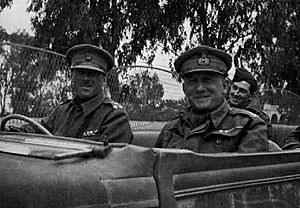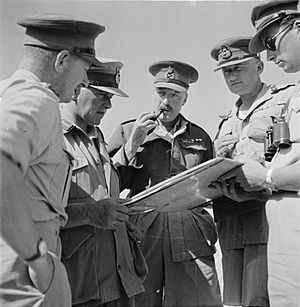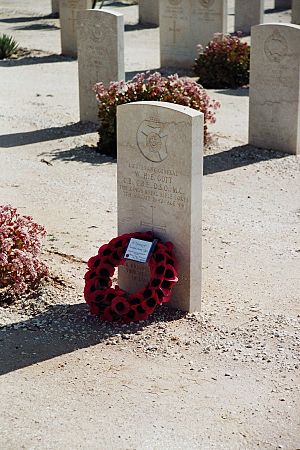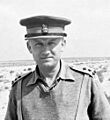William Gott facts for kids
Quick facts for kids
William Gott
|
|
|---|---|
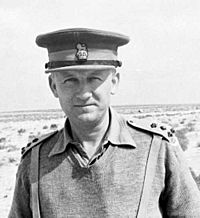 |
|
| Nickname(s) | "Strafer" |
| Born | 13 August 1897 Scarborough, North Yorkshire, England |
| Died | 7 August 1942 (aged 44) near Alexandria, Egypt |
| Buried |
Alamein Memorial, El Alamein, Egypt
|
| Allegiance | United Kingdom |
| Service/ |
British Army |
| Years of service | 1915–1942 |
| Rank | Lieutenant-general |
| Service number | 1798 |
| Unit | King's Royal Rifle Corps |
| Commands held | XIII Corps (1942) 7th Armoured Division (1941–42) 2nd Support Group (1941) 7th Support Group (1940–41) 1st Battalion, King's Royal Rifle Corps (1938–39) |
| Battles/wars | First World War Second World War |
| Awards | Companion of the Order of the Bath Commander of the Order of the British Empire Distinguished Service Order & Bar Military Cross Mentioned in despatches |
Lieutenant-General William Henry Ewart Gott (13 August 1897 – 7 August 1942) was a senior British Army officer. He was known by the nickname "Strafer". Gott fought in both the First World War and the Second World War. He rose to a high rank while serving with the British Eighth Army. This was during the Western Desert and North Africa from 1940 to 1942. In August 1942, he was chosen to lead the Eighth Army. However, he was killed when his plane was shot down on his way to take command. His death led to Bernard Montgomery becoming the new commander.
Contents
William Gott's Military Journey
William Gott went to Harrow School when he was younger. In February 1915, he joined the King's Royal Rifle Corps (KRRC) as a second lieutenant. He served bravely in France during the First World War. His nickname "Strafer" was a playful jab at a German war slogan. The slogan was Gott strafe England, which means "God punish England."
After the war, he continued his military career. He became a captain in January 1921. He also attended a special training school for army officers. He was promoted to major in July 1934. Before the Second World War, he worked in different roles. This included time in India.
Fighting in North Africa
In October 1938, Gott became a lieutenant-colonel. He took command of the 1st Battalion, KRRC. This unit moved from Burma to Egypt. It became part of the Mobile Division. This division later became the famous 7th Armoured Division, also known as the "Desert Rats."
Gott held several important jobs within this division. He was the chief staff officer. Then he commanded the Support Group. Finally, he became the acting General Officer Commanding of the 7th Armoured Division.
Under Gott's leadership, the Support Group did very well. They fought along the border from June 1940. They also made a planned retreat in September during the Italian invasion of Egypt. In December, they took part in Operation Compass. This operation led to the capture of Cyrenaica. It also helped destroy the Italian Tenth Army by February.
When the German Afrika Korps arrived, led by Erwin Rommel, the Axis forces counter-attacked. This happened in April during Operation Sonnenblume. Gott's 7th Support Group helped stabilize the front lines. They also helped reorganize the retreating forces. This was done at the border between Libya and Egypt.
In May, Gott led a special force for Operation Brevity. This operation successfully took back the Halfaya Pass. However, it did not achieve all its goals. Another larger operation, Operation Battleaxe, also failed. These events led to changes in the Western Desert commands. Gott was then promoted to lead the 7th Armoured Division.
During the next big attack by the Commonwealth, Operation Crusader, in November 1941, the 7th Armoured Division faced tough fighting. They were heavily damaged by the Afrika Korps at the battle of Sidi Rezegh. But they stayed in the fight and helped the British Eighth Army win in the end.
Gott became a full colonel in October 1941. He was then promoted to acting lieutenant-general. In early 1942, he was given command of XIII Corps.
During the Battle of Gazala, the 8th Army struggled. Relationships between commanders were difficult. Within XIII Corps, Gott's relationship with Dan Pienaar, who led the 1st South African Division, became very bad. Despite this, XIII Corps managed to retreat in good order. They reached the Alamein position. They were key in stopping the Axis forces there during the First Battle of El Alamein.
Gott's Death
In August 1942, British Prime Minister Winston Churchill made a change. He removed General Sir Claude Auchinleck from his command. Churchill liked Gott's bold and energetic personality. Also, Anthony Eden, who had served with Gott in the First World War, highly recommended him. So, Gott was chosen to take over the Eighth Army.
However, some high-ranking officers had doubts. General Sir Alan Brooke, a top army chief, knew Gott well. He thought Gott was a good officer. But he also felt that Gott was tired from being in the desert since the war began. Brooke believed Gott needed more experience before leading an entire army.
Before Gott could start his new job, he was killed. He was traveling in a transport plane back to Cairo from the battle area. The plane, a Bristol Bombay, was shot down. Two German Messerschmitt Bf 109 fighter planes attacked it. The pilot managed to crash-land the plane. But the German fighters attacked again, destroying the plane. Everyone who could not escape, including Gott, died.
Gott was buried at the El Alamein War Cemetery. His replacement as commander of the Eighth Army was Bernard Montgomery. It was later discovered that the Germans knew Gott was on the plane. They had likely intercepted messages.
What People Thought of Gott
William Gott was a big man with a strong, friendly personality. Soldiers under his command liked him a lot. However, some people thought he was not quite ready for such a high command role.
Authors John Bierman and Colin Smith said Gott was admired for his character. But they felt he lacked great military skill. He was one of the few senior officers known and liked by regular soldiers. However, they noted that his actions in North Africa did not show amazing tactics.
Field Marshal Sir Michael Carver, who served under Gott, agreed. He said Gott was the person everyone looked to for advice and encouragement. But Carver also believed Gott was "too good a man to be a really great soldier." Gott himself felt he might not be the right person for the job. But he was ready to do it if ordered. Churchill later seemed to agree that choosing Gott instead of Montgomery was a mistake. This was after seeing how Montgomery improved the Eighth Army.
In 2012, Gott's daughters gave his medals to the Royal Green Jackets (Rifles) Museum.
Images for kids
 | William M. Jackson |
 | Juan E. Gilbert |
 | Neil deGrasse Tyson |


